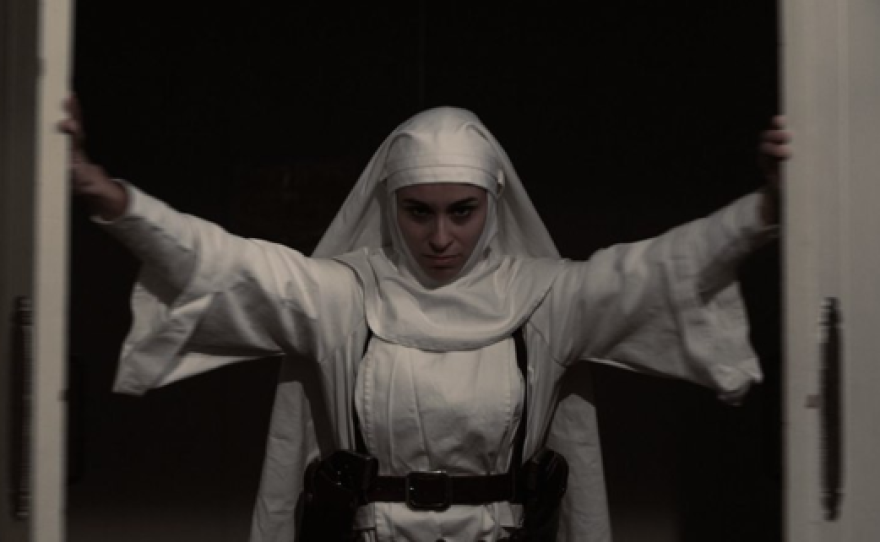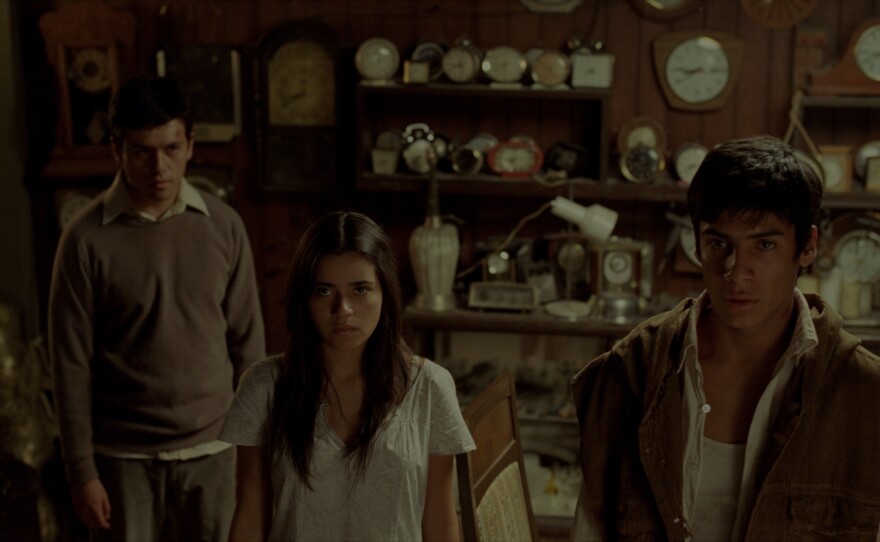KPBS-FM Radio Film Review: 18th Annual San Diego Latino Film Festival By Beth Accomando Air date: March 10, 2011 HOST INTRO: Filmgoers have two film events to choose from this weekend as IndieFest and the San Diego Latino Film Festival both open. KPBS film critic Beth Accomando says there's a wealth of films to chose from at the 18th Annual Latino Film Festival. SDLFF (ba).wav SOQ 3:58 (music out at 5:00) (Tag:) The San Diego Latino Film Festival opens tonight (Thursday) at the UltraStar Mission Valley Theaters at Hazard Center. For more information go to K-P-B-S-dot-O-R-G-slash-cinema-junkie. TZSDLFF.wav The San Diego Latino Film Festival boasts quite a range this year as it takes you from "Nude Nuns with Big Guns" to "La Mama: An American Nun's Life in a Mexican Prison." CLIP: Her entrance into the prison yard and her unique brand of Spanish have always inspired smiles and greetings from the inmates...we could be in like a fight, in the middle of a big fight and she comes in and everybody stops. Let her pass. (:14) The festival kicks off its 18th season tonight (Thursday). KPBS film critic Beth Accomando has a preview of the film offerings coming up on Morning Edition. A film festival is defined by its choices. So I love the fact that the 18th Annual San Diego Latino Film Festival is screening both "Nude Nuns with Big Guns" and "La Mama: An American Nun's Life in a Mexican Prison." The former teases us with the festival's most enticing title as it serves up an exploitation film about, well, nude nuns and big guns. CLIP Four shots, the sign of the cross. Unfortunately the film doesn't live up to the promise of its title and only offers an uninspired Robert Rodriguez rip off. "La Mama," on the other hand, is a locally produced documentary that delivers an engaging portrait of Mother Antonia, an American nun that Father Joe affectionately calls a "thief" CLIP He says that I'm a thief, he says when Mother Antonia comes he says lock everything up. But what she's stealing is food for the prisoners she tends to in Mexico. "La Mama" is part of this Saturday's Cine Mujer showcase of films by and for women. The festival creates a number of showcases to help guide attendees. So you can find sidebar showcases for CineGay and Documania. But then there are films that defy simple categories like Carlos Saura's "Flamenco, Flamenco." CLIP Music starts It's a documentary in the sense that it's not a fictional narrative. It explores the history and tradition of flamenco dance and music. Yet it does more than merely document. It's a stunning work of art. Saura places dancers and musicians on an almost bare stage. Then he adds gorgeous lighting and set design but employs mostly static wide shots and minimal cuts. This allows the beauty and power of flamenco to take center stage. CLIP just the sound of dancing Less is definitely more in Saura's capable hands and "Flamenco, Flamenco" is breathtaking. There's also a breathtaking display of physical skill in "Besouro," a film that mixes history with magic realism to spin a tale about the origins of capoeira. CLIP Brazilian music The film opens in 1924. Slavery in Brazil had been abolished yet those of African descent are still treated like slaves. Besouro is a young Brazilian man of African descent and skilled at the art of capoeira, a blend of martial arts, dance, music, and athleticism. But those who defy the law and practice capoeira are subjected to violence from the authorities. CLIP violence The violence is especially brutal because the only way to disarm a man whose body is his weapon is to break his bones. "Besouro" is a stunning action film but one with the distinct poetry of Brazil. Festivals are the best place to experiment, to push boundaries, and to try something different. So if you want to be adventurous try "We Are What We Are," a film that takes you some place very dark but does so with an assured mix of savvy social commentary and black humor. The film opens in an upscale mall where a man drops dead. He's quickly cleared away so as to not disturb the mall's rich clientele. But when the police do an autopsy... CLIP Autopsy They find a human finger in his stomach prompting the coroner to casually assert, "So many eat others in this city." Yes, this is a film about cannibalism in contemporary Mexico City. But cannibalism is not really the subject of the film ¬ it's about family dynamics and about the growing gap between the haves and the have nots. For the moment, money insulates certain segments of society and keeps them safely tucked away from the dark places explored in "We Are What We Are." But the horrors of this film will not go away by merely turning a blind eye. Once again the San Diego Latino Film Festival serves up a diverse array of films, so whether you want to be challenged or merely entertained there's something here for you. For KPBS, I'm Beth Accomando (music out)
Filmgoers have two film events to choose from this weekend as IndieFest and the San Diego Latino Film Festival both open. IndieFest is a relative newcomer but the San Diego Latino Film Festival is now in its 18th year. (Click on film titles to see when films screen and to purchase tickets.)
A film festival is defined by its choices. So I love the fact that the 18th Annual San Diego Latino Film Festival is screening both "Nude Nuns with Big Guns" and "La Mama: An American Nun's Life in a Mexican Prison." The former teases us with the festival's most enticing title as it serves up an exploitation film about, well, nude nuns and big guns.

Sister Sarah: Four shots. Forehead, sternum, shoulder, shoulder, The sign of the cross.
Unfortunately the film doesn't live up to the promise of its title and only offers an uninspired Robert Rodriguez rip off.
"La Mama," on the other hand, is a locally produced documentary that delivers an engaging portrait of Mother Antonia, an American nun that Father Joe affectionately calls a "thief"
Mother Antonia: He says that I'm a thief, he says when Mother Antonia comes he says lock everything up.
But what she's stealing is food for the prisoners she tends to at an infamous Tijuana prison. The film shows how in her 30 years working the prison she has earned the respect of officials and prisoners alike.
Narrator: Her entrance into the prison yard and her unique brand of Spanish have always inspired smiles and greetings from the inmates.
Inmate: We could be in like a fight, in the middle of a big fight and she comes in and everybody stops. Let her pass.
The festival creates a number of showcases to help guide attendees. So you are interested in gay, lesbian, bisexual or transgender films then check out CineGay. If you fancy documentaries, there's Documania. But then there are films that defy simple categories like Carlos Saura's "Flamenco, Flamenco."

It's a documentary in the sense that it's not a fictional narrative. It explores the history and tradition of flamenco dance and music. Yet it does more than merely document. It's a stunning work of art. Saura places dancers and musicians on an almost bare stage. Then he adds gorgeous lighting and set design but employs mostly static wide shots and minimal cuts. This allows the beauty and power of flamenco to take center stage.

Less is definitely more in Saura's capable hands and "Flamenco, Flamenco" is breathtaking. There's also a breathtaking display of physical skill in "Besouro," a film that mixes history with magic realism to spin a tale about the origins of capoeira.

The film opens in 1924. Slavery in Brazil had been abolished decades ago yet those of African descent are still treated like slaves. Besouro is a young Brazilian man of African descent and skilled at the art of capoeira, a blend of martial arts, dance, music, and athleticism. But those who defy the law and practice capoeira are subjected to violence from the authorities. The violence is especially brutal because the only way to disarm a man whose body is his weapon is to break his bones. "Besouro" is a stunning action film but one with the distinct poetry of Brazil.

Festivals are the best place to experiment, to push boundaries, and to try something different. So if you want to be adventurous try Jorge Michel Grau's "We Are What We Are," a film that takes you some place very dark but does so with an assured mix of savvy social commentary and black humor. The film opens in an upscale mall where a man drops dead. He's quickly cleared away so as to not disturb the mall's rich clientele. But when the police do an autopsy and find a human finger inside the man's stomach prompting the coroner to casually assert, "So many eat others in this city."
Yes, this is a film about cannibalism in contemporary Mexico City. Although Grau doesn't cite the recent case of José Luis Calva Zepeda -- an alleged serial killer who ate his victims -- it must have influenced him in creating his film. But cannibalism is not really the subject of the film. Like the recent Greek film "Dogtooth," "We Are What We Are" is about family dynamics and depicts a dysfunctional family. In the case of "We Are What We Are," the family is like a tribal unit. In an interview with "The PlayList", Grau said: "I guess the gist of what the story wanted to convey is the sense that in a country where there’s about forty to fifty murders on a daily basis that unless you belong to one of these tribal structures that will protect you, it’d be a very dangerous situation."
The film is also about the growing gap between the haves and the have nots. For the moment, money insulates certain segments of society and keeps them safely tucked away from the dark places explored in "We Are What We Are." But the horrors of this film will not go away by merely turning a blind eye.
Once again the San Diego Latino Film Festival serves up a diverse array of films, so whether you want to be challenged or merely entertained there's something here for you.






